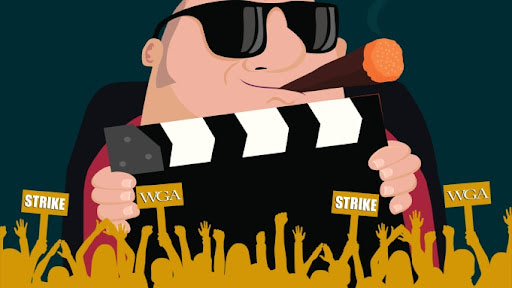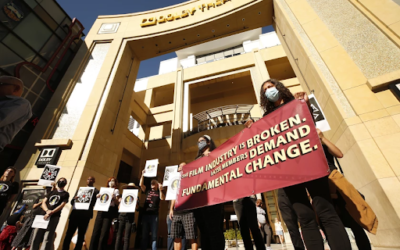Source: Deadline
Although a strike can ultimately be of great benefit to a given party in the long run, the period in which the strike takes place is anything but beneficial to either employer or employee. The current Writers Guild of America (WGA) strike, for example, is taking its toll on both the guild itself, one that consists of just over 15,000 film and television screenwriters, and the Alliance of Motion Picture and Television Producers (AMPTP), which represents the various studios that employ these several writers for their wide array of productions. For the AMPTP, having no writers to produce scripts for whichever films and series they seek to create means they are unable to continue production and work towards earning a profit from these creations, resulting in the studios losing millions on a weekly basis. Those that make up the WGA, meanwhile, cannot earn any money from their work on account of them being on strike and therefore refusing to do their jobs, meaning that they too are suffering a significant financial loss as this moment. There’s no denying that both sides want this strike to come to an end, but what they each hope to achieve by its conclusion could not be more different – writers want better pay, the studios want to pay the writers less – so the strike has no choice but to continue. Of course, while the studios and producers have millions, if not billions, of dollars and can therefore sustain losses for the time being, the writers do not have anywhere near such a degree of weath (which is the main reason why they’re striking to begin with). This, unfortunately, is exactly what studios are banking on in order to put a stop to the WGA’s strike.
At this current moment in time, not one of the major Hollywood studios seems willing to sit down with the WGA and negotiate a new contract, as they instead appear to be adamant about letting the strike go on until the writers have completely used up all of what remains of what little financial resources they currently have. That’s at least what one industry veteran with strong connections to the studios has argued; “I think we’re in for a long strike, and they’re going to let it bleed out,” they claim. With the WGA strike reaching its 71st day (at the time of this writing) and the Screen Actors Guild – American Federation of Television and Radio Artists (SAG-AFTRA) on the verge of their own strike (one that would bring Hollywood to an even greater standstill than what it’s currently experiencing), the studios could easily avoid all of this by simply giving into the strikers’ demands (which, according to recent data, would cost them far less than what they’re currently losing to the strike). However, their desire to control their workers appears to outweigh their desire to keep as much money as they possibly can at the moment (one can’t help but be reminded of this line from “A Bug’s Life”: “It’s not about the food. It’s about keeping those ants in line”), so the studios are more than happy to let the writers continue their strike without any real progress being made.
When will studios start to be at least a bit more open to the possibility of sitting down for talks with the WGA again? “Not Halloween precisely, but late October, for sure, is the intention,” one producer with ties to the AMPTP claims; should this be accurate, it will be two-and-a-half to three whole months before the guild will be able to begin negotiations on a new contract. By this point, the studios hope, the writers will have almost completely drained their resources in the five months they’ll be on strike and will thus come crawling back to their employers begging to work and be paid again. Some may dismiss such claims as the studios attempting to appear tougher than they are, but others allege that this has been the plan since the very beginning of the strike. “It’s been agreed to for months, even before the WGA went out,” states one anonymous executive. “Nobody wanted a strike, but everybody knew this was make or break.”
It should come as no surprise that Wall Street has expressed its approval of the studios’ willingness to, as one executive put it, “break the WGA” by forcing its members to go for such a long period without receiving any sort of financial support from their employers. “The endgame is to allow things to drag on until union members start losing their apartments and losing their houses,” one executive alleges, a mission that some have described as “a cruel but necessary evil” (although others would argue that there’s nothing “necessary” about such actions).
What studios are hoping for is the WGA being desperate for renegotiate before the start of the holiday season, which would enable the AMPTP to have complete control over the new contract without the WGA having any real say over what goes into it. However, if one were to ask any member of the guild if there was any chance of them stooping to such a level, the answer would almost universally be a resounding “no”. Even with the financial strains burdened by the ongoing strike, there’s little evidence to suggest that the WGA has any plans to back down from what they are seeking. It doesn’t hurt that each of the guild’s thousands of members and those who support appear to be in nearly full solidarity with one another, to a point where there are even various campaigns in which one can donate to various organizations aiming to keep the writers on their feet for as long as possible. One of these groups, the Green Envelope Grocery Aid, has already received over 40,000 donations and provided 376 striking writers with roughly $100 worth of grocery money, and the group will continue to accept donations for as long as the strike goes on. It’s just one of many different ways in which the public is coming out to support the writers, which means that the AMPTP may not have as much power as it thinks it will have once the end of the year approaches.
For the time being though, both the WGA and the AMPTP remain firmly in place as the former’s strike continues into its third month. Should SAG-AFTRA also go on strike, Hollywood will certainly be at greater financial risk (one that it could completely avoid if it agreed to what the guilds are demanding from them), but for now, it seems that the WGA is on its own when it comes to its push back against the studios. Then again, with so many people showing their support, the WGA may not be nearly as powerless as the AMPTP and the studios it represents would like to believe.




